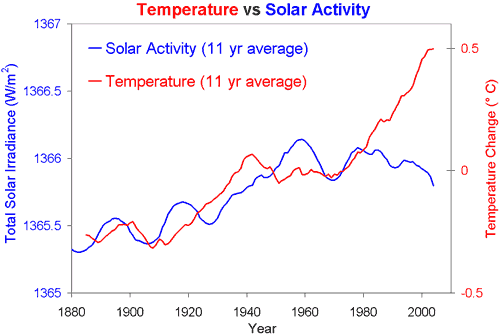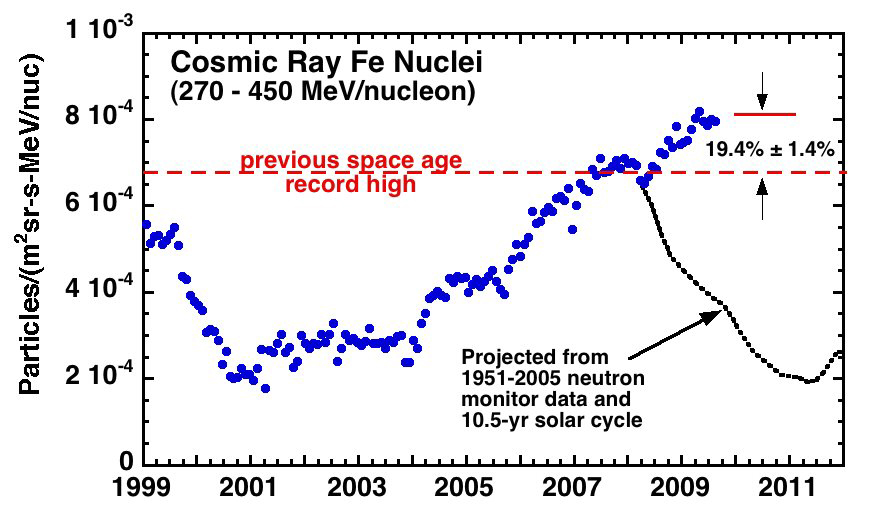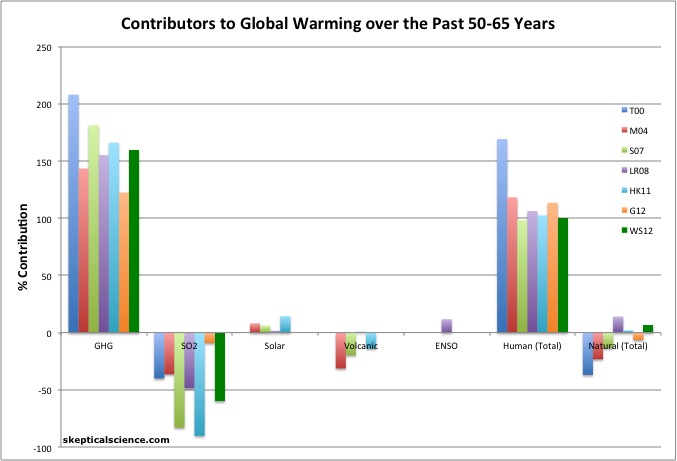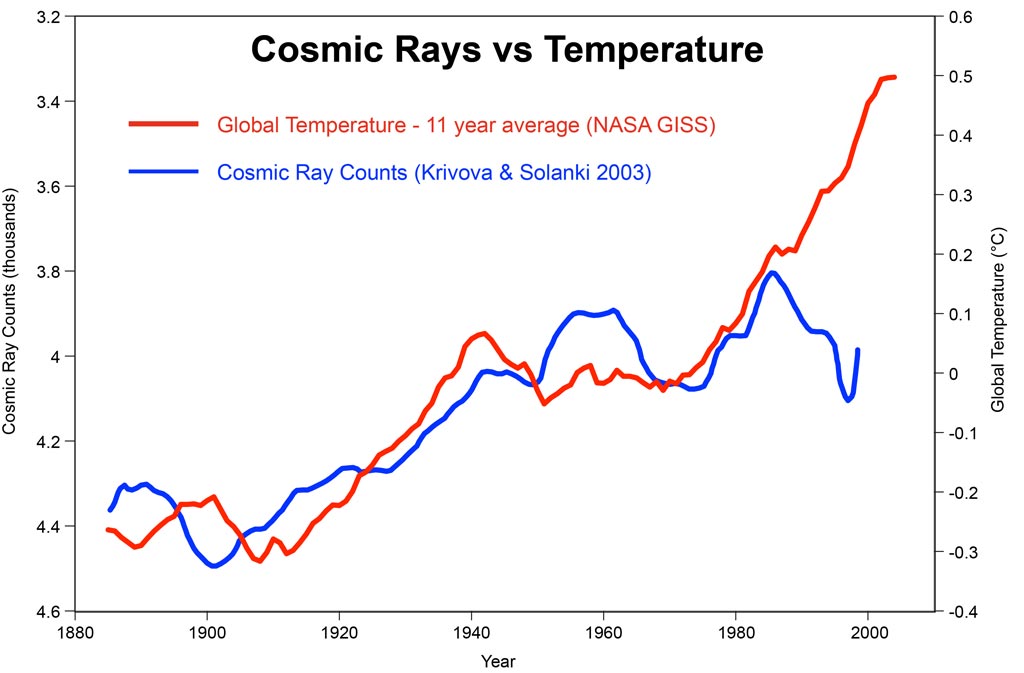IPCC Draft Report Leaked, Shows Global Warming is NOT Due to the Sun
Posted on 14 December 2012 by dana1981
This post has been re-published by The Guardian
Alec Rawls, an occasional guest poster on the climate contrarian blog WattsUpWithThat who signed up to review the upcoming Intergovernmental Panel on Climate Change (IPCC) Fifth Assessment Report (as anyone can), has "leaked" a draft version of the report and declared that it "contains game-changing admission of enhanced solar forcing." This assertion was then repeated by James Delingpole at The Telegraph (with some added colorful language), and probably on many other climate contrarian blogs.
If the IPCC was to report that the sun is a significant player in the current rapid global warming, that would indeed be major news, because the body of peer-reviewed scientific literature and data clearly show that the sun has made little if any contribution to the observed global warming over the past 50+ years (Figure 1).
Figure 1: Percent contributions of greenhouse gases (GHGs), sulfur dioxide (SO2), the sun, volcanoes, and El Niño Southern Oscillation (ENSO) to the observed global surface warming over the past 50-65 years according to Tett et al. 2000 (T00, dark blue), Meehl et al. 2004 (M04, red), Stone et al. 2007 (S07, green), Lean and Rind 2008 (LR08, purple), Huber and Knutti 2011 (HK11, light blue), Gillett et al. 2012 (G12, orange), and Wigley and Santer 2012 (WS12, dark green).
So why would the latest IPCC report contradict these studies when its purpose is to summarize the latest and greatest scientific research? The answer is simple — it doesn't. Rawls has completely misrepresented the IPCC report.
Cosmic Source of Confusion
The supposedly "game-changing admission" from the IPCC report is this:
"Many empirical relationships have been reported between GCR [galactic cosmic rays] or cosmogenic isotope archives and some aspects of the climate system...The forcing from changes in total solar irradiance alone does not seem to account for these observations, implying the existence of an amplifying mechanism such as the hypothesized GCR-cloud link."
This statement refers to a hypothesis of Henrik Svensmark from the Danish National Space Institute, who has proposed that galactic cosmic rays (GCRs) could exert significant influence over global temperatures. The GCR hypothesis suggests that when they reach Earth, GCRs (high-energy charged particles originating from somewhere in our galaxy) are capable of "seeding" clouds; thus at times when a lot of GCRs are reaching the Earth's surface, more clouds will form. Clouds generally have a cooling effect on the Earth's temperature, because they reflect sunlight.
So the hypothesis goes like this: high solar activity means a strong solar magnetic field, which deflects more GCRs away from Earth, which means less cloud formation, which means less sunlight is reflected away from Earth, which means more warming. This GCR-caused warming would amplify the warming already being caused by increased solar activity. Conversely, cooling from decreased solar activity would hypothetically be amplified by more GCRs on Earth, more clouds, more reflected sunlight, and thus more cooling.
It's important to note that so far virtually all scientific research on GCRs has shown that they are not effective at seeding clouds and thus have very little influence over the Earth's temperature. In fact, as Zeke Hausfather has noted, the leaked IPCC report specifically states this:
"...there is medium evidence and high agreement that the cosmic ray-ionization mechanism is too weak to influence global concentrations of [cloud condensation nuclei] or their change over the last century or during a solar cycle in any climatically significant way."
But more importantly in this context, even if GCRs did influence global temperature, they would currently be having a cooling effect.
Solar Activity is Down, Greenhouse Gases are Up
Rawls also provides the following quote from the IPCC report (emphasis added):
"There is very high confidence that natural forcing is a small fraction of the anthropogenic forcing. In particular, over the past three decades (since 1980), robust evidence from satellite observations of the TSI [total solar irradiance] and volcanic aerosols demonstrate a near-zero (–0.04 W m–2) change in the natural forcing compared to the anthropogenic AF increase of ~1.0 ± 0.3 W m–2."
The term "radiative forcing" refers to a global energy imbalance on Earth, which may be caused by various effects like changes in the greenhouse effect or solar activity. A positive forcing will result in warming temperatures, while a negative forcing will result in cooling.
Here the IPCC is saying that since 1980, the sun and volcanoes have combined to cause a slightly negative global energy imbalance, which means they have had a slight cooling influence on global temperatures over the past three decades. Indeed, solar activity has decreased a bit over that timeframe (Figure 2).

Figure 2: Global temperature (red, NASA GISS) and Total solar irradiance (blue, 1880 to 1978 from Solanki, 1979 to 2009 from PMOD), with 11-year running averages.
As we would expect, lower solar activity including a weaker solar magnetic field has translated into a slight increase in GCR flux on Earth (Figure 3). Note that on the left-hand axis of Figure 3, GCR counts decrease going up the axis in order to show the relationship with temperature, since fewer GCRs hypothetically means fewer clouds, less reflected sunlight, and higher temperatures.
Figure 3: Global average surface temperature (red, NASA GISS) vs. GCR flux on Earth (blue, Krivova & Solanki 2003), with 11-year running averages.
So, if GCRs really do amplify the solar influence on global temperatures, since 1980 they are amplifying a cooling effect. In fact, GCRs reaching Earth recently hit record high levels (Figure 4), yet temperatures are still way up.

Figure 4: Record cosmic ray flux observed in 2009 by the Advanced Composition Explorer (NASA)
Physical Reality Intrudes on Rawls
Rawls has argued to the contrary by claiming that the climate is still responding to the increase in solar activity from the early 20th century, and that GCRs are amplifying that solar warming from over 60 years ago. This argument is simply physically wrong. As Figure 2 illustrates, when solar activity rises, temperatures follow suit very soon thereafter. In fact, during the mid-20th century, solar activity and global surface temperatures both flattened out. Are we to believe that the planet suddenly began responding to the pre-1950 solar activity increase in 1975—2012, after not warming 1940—1975? The argument makes no physical sense.
On top of that, the hypothetical GCR process is a relatively rapid one. Cloud formation from GCR seeding should occur within days, and clouds have very short lifetimes. For GCRs to have a warming effect, solar activity must be increasing right now. It is not, in fact solar activity has been essentially flat and slightly declining in recent decades. Changes in solar activity from 60+ years ago have no bearing whatsoever on GCRs today.
IPCC Shows Global Warming is NOT Solar
To sum up,
- The leaked IPCC report states that there may be some connection between GCRs and some aspects of the climate system.
- However, the report is also consistent with the body of scientific literature in stating that research indicates GCRs are not effective at seeding clouds and have very little influence on global temperatures.
- Solar activity has been nearly flat and slightly decreasing in recent decades, meaning that if GCRs do amplify solar influences on climate, they are amplifying a cooling effect.
The body of peer-reviewed scientific literature is very clear: human greenhouse gas emissions, not solar activity or galactic cosmic rays, are causing global warming. The leaked IPCC report is entirely consistent with this conclusion. In fact, in attempting to argue to the contrary, Rawls has scored an own goal by showing that if anything, GCRs are currently amplifying a solar cooling effect.































 Arguments
Arguments
































[DB] Let me point out something from the Comments Policy to you:
As KR points out below, you simply have not established your case. Simply repeating it, re-phrased, is insufficient. This is a science-based website. As such, the onus is on you and Mr. Rawls to prove your point with links from the published, reputable literature that actually support your case. Failing that, further prosecution of this line of discussion is without merit...and will be moderated accordingly.